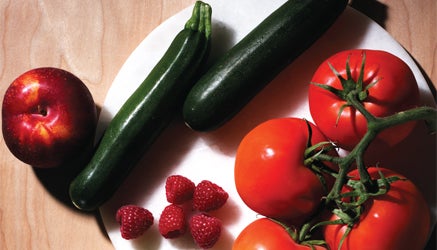Why Go Organic?

Q: Is organic food better for me?
A: Yes. By choosing organic, you’ll go a long way toward reducing your exposure to chemicals.
In the world of food production, “organic” does not refer to organic chemistry, organic matter, or any other such thing. The term was coined by English agriculturalist Walter James in the mid-20th century to reflect the sense that a farm is like a living organism. Today, government regulations define organic to mean that the use of pesticides, insecticides, herbicides, and other chemicals is avoided or greatly restricted. In the United States, the National Organic Program of the USDA sets standards for organic agriculture. Other countries have similar bodies.
If a fruit or vegetable is grown in accordance with government organic standards, it can bear the USDA Organic label. For food products that contain multiple ingredients, such as crackers or frozen foods, you’ll see one of three different labels:
“100% Organic” means that the product (by weight or volume) contains only organic ingredients.
“Organic” means that 95 percent of a product consists of organically produced ingredients.
“Made with Organic Ingredients” means a product contains at least 70 percent organic ingredients.
The big advantage to choosing organic food is that it is much lower in chemical residues. This makes a real difference for certain fruit and vegetable crops that are heavily treated with pesticides. According to the Environmental Working Group, these include celery, peaches, strawberries, apples, blueberries, nectarines, bell peppers, spinach, kale, cherries, potatoes, and imported grapes. If you eat any of these foods, buying organic is smart.
On the other hand, the difference between organic and “conventional” is not as great for onions, avocados, sweet corn, pineapples, mangoes, sweet peas, asparagus, kiwifruit, cabbage, eggplant, cantaloupe, watermelon, grapefruit, sweet potatoes, and honeydew melon.
The second advantage is that fewer chemicals used in growing means fewer chemicals ending up in rivers and streams. Worldwide, 6 billion pounds of pesticides are applied to food crops every year. Going organic makes agriculture healthier, not just for you, but for everyone downstream from where crops are grown.
So, organic produce is better for you and for the environment.
Q: What about genetically modified organisms?
A: USDA regulations bar the use of organic labeling for GMO foods. Farmers who aim to produce new varieties must do so with traditional hybridization techniques.
Q: Is organic food more nutritious?
A: Well, that’s another matter. A 2009 report commissioned by the United Kingdom Food Standards Agency analyzed the results of 55 previous studies. The report found that nutritionally, organic and “conventional” produce was pretty much the same. In other words, an organic apple or carrot may be free of contaminants and might help the Earth breathe easier, but it is not likely to give you more vitamins and minerals, compared with “conventionally” grown produce.
The USDA sets standards for organic production of animal products too. They require that commonly used agricultural chemicals not be administered at all or, in some cases, that a washout period be observed before meat or milk from a treated animal can be sold. While reducing these chemical residues is a good idea, the health risks commonly attributed to animal products (e.g., heart disease, weight problems, and diabetes) are linked to fat and cholesterol, not to chemical residues. So going organic will not help you there. And, of course, organic regulations do not require that the animals be treated well.
Bottom line: buying organic produce is a good idea, especially for fruits and vegetables that are commonly treated with pesticides.